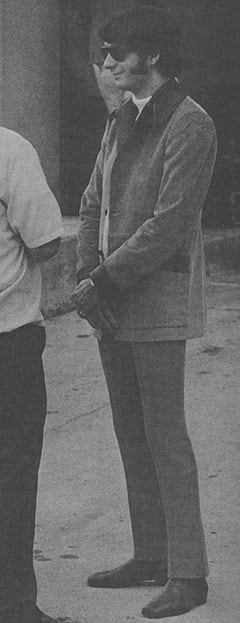
(The Monkees have been with us for nearly two super-years now. A lot has happened to them—and to all of us—during that period. We asked Carol Deck, FLIP’s Hollywood Editor, who has been close to the group, to tell us how each of them has changed, if at all, during these twenty-three months. This is the second and final part of her report. Last month Carol talked about Peter and Micky.)
When the Monkees first began to happen Mike was the one who stood out the least and whom the least was known about. The first things anyone knew of him was that he was a Texan, a former folk singer and a married man. He seemed to stay in the background as the personalities of the other three became more and more public and this was the way he preferred it.
It wasn’t that there wasn’t much to him; it was just that he was, and still is a very private person who saw no reason for letting everyone in on what was going on in his mind, his home or his life. In this respect Mike Nesmith has not changed. He still is a Texan, a former folk singer, a married man and a very private person.
But then a public image for Mike began to emerge. At first it was often a comparison to John Lennon—he was the only one in the group that was married, his humor seemed to be rather on the sly side, he seemed as though he might be the intellect of the group, and it was rumored he was writing a book.
He eventually overcame the John Lennon comparisons and developed into his own public personality. People got to know Mike—tall and thin, slow talking, long thinking, devoted to his family and their privacy, a good guitarist, perhaps the best musician in the group, and a man with a bit of a temper when he feels he’s being imposed on.

But there is one part of the image of Mike Nesmith that irritates Mike today. “I have a reputation for being sullen,” he told FLIP, “And what I don’t understand is why gentle men are always considered sullen.”
And Mike is indeed a gentle man—perhaps he is also sullen sometimes. His humor may be one reason for the sullen tag. He becomes irritated when expected to be clever and witty 24 hours a day and slips into a humor that is often harsh, sometimes even crude, in defense.
He is also quiet and quietness is often mistaken for sullenness. When he has nothing to say, he doesn’t small talk just to fill in the time. He simply shuts up. It is not that he is angry or speechless; he merely feels there is nothing to be said.
This is Mike Nesmith 1968—a young man who loves and is loved by a wife and two children, a musician who seeks to try new things and combinations of old things, an actor who idolizes W.C. Fields, a Southerner with the gracious manners and basic respect for femininity typical of the American South, a member of the now generation who believes that peace and love are the answers and that war solves nothing, a complete human being with thoughts and feelings like anyone else but with a certain something that makes him stand out above others—Mike Nesmith, a member of the Monkees.
